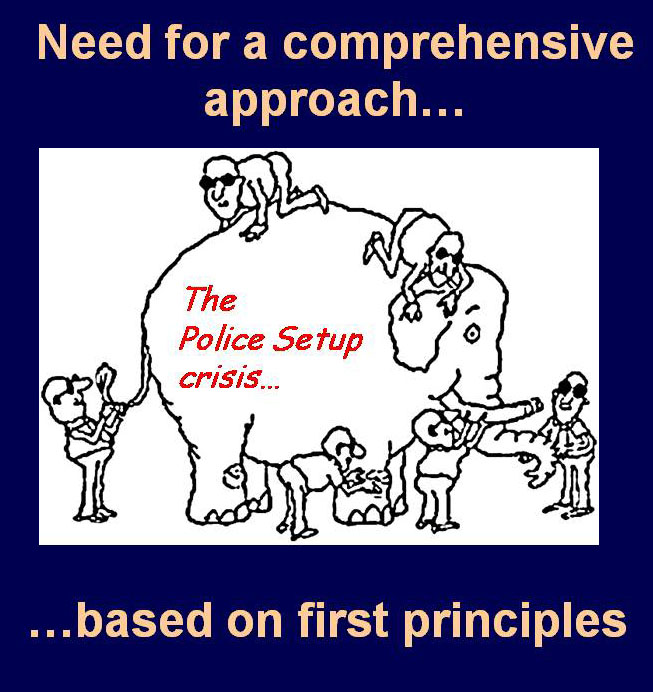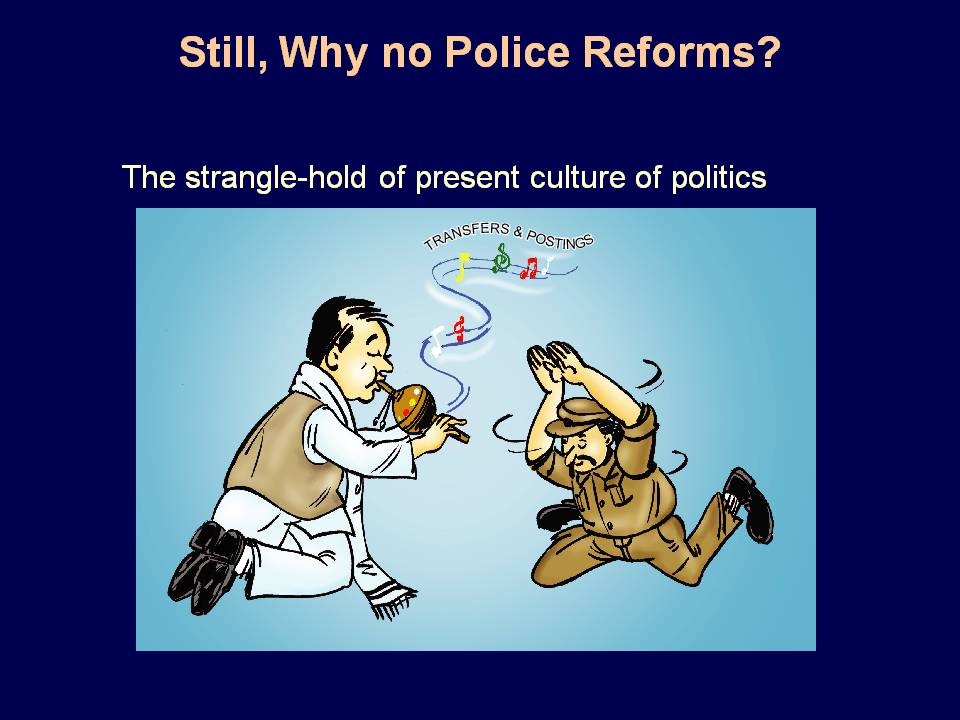Police Reforms
Police forms a direct link between the citizens and the justice delivery mechanism. They are identified to be the visible and accessible agents of the government. Sadly though, governments today are failing in their primary duty to provide the public with an honest, efficient and effective police service that ensures rule of law and an environment of safety and security.
India’s police are governed by archaic and colonial police laws dating back to 1861. The Indian Constitution puts police under the state list, empowering the state governments to provide their communities with a police service. However, most state governments have a police law that adopts or reflects the basic ideas of the 1861 legislation. Further slurring the line between the executive and police establishment has led to bias in posting and transfers thus diminishing the accountability of the police system.
Various committees like the Riberio, Padmananbhaiah and Soli Sorabjee have given their recommendations which have been futile. FDR has strongly voiced its concern for reforms in this segment. It has organized extensive campaigns for police reforms seeking autonomous investigations free from political influence. It advocated the idea of bringing police forces under the purview of the local government jurisdiction. It also proposed the idea of community policing as a tool to combat terrorism and eve-teasing.
In the year 2006, in the case of Prakash Singh v. Union of India &Ors., the Hon’ble Supreme Court of India issued directions to all state governments. FDR strongly campaigns to ensure the effective implementation of the Supreme Court guidelines in letter and spirit.
The following are the reforms that FDR advocates for bringing police reforms :
- Separating crime investigation from the other wings of police dealing with law and order
- Increasing accountability, setting up suitable institutional mechanisms for effective monitoring
- Improving the working conditions of the police personnel and recruiting more women personnel
- Independent prosecution with a District Attorney to guide and supervise all investigation and prosecution
- Decentralisation of power through effective local policing and that constables be promoted as thinking policemen rather than a mindless tool
- New Police Bill be enacted as per the Supreme Court directives
The relationship between police and public needs to be redrawn. The flimsy democratic umbrella providing a tenuous cover for engagement between police and the public urgently needs reconstruction.


Civil Service Reforms
Fierce competition in the recruitment of All-India services and central services ensures that very bright, competent, young people join these services. However, there is a wide spread feeling that the people are not getting clean and efficient administration, and delivery of services is tardy and ineffective most often.
Many expert committees including the Second Administrative Reforms Commission have examined this issue and given recommendations.
- There is no specialization in civil services, and often officers are expected to handle diverse subjects without adequate exposure or expertise
- There is assured rise in service irrespective of competence and delivery, and there are no incentives to perform well
- There is a monopoly of IAS and a few privileged services in all senior government positions, and the best and brightest in the nation have very little opportunity to serve the nation out of passion and commitment, unless they choose civil services as a life-long career
- The officials are inadequately empowered to deliver, and are often chosen arbitrarily and transferred frequently, demotivating them and resulting in poor delivery
A fundamental restructuring and reform of Civil services is needed to address these four challenges.In this backdrop FDR is recommending the following
- Every officer should gain domain expertise in one area of administration after the initial years of field postings, say 12 years, and should serve for the remainder of her service only in those chosen sectors. Second Administrative Reforms Commission has given a detailed road map to implement this
- There should be a mechanism to compulsorily retire officers after 15 years, 20 years, 25 years and 30 years of service after thorough review of their performance and potential. A provision should be made to this effect in Civil Services law. For new appointments it should be expressly provided that the period of employment shall be for 15 – 20 years, and further continuance in government service would depend upon the outcome of intensive performance reviews
- For all senior positions, there should be notification and selection of officials through competition and choice, drawing the best among various-careers civil service, academia management, private sector and civil society. All appointees will get a term of five years in senior positions, and may be reappointed for another term of five years by mutual agreement. All efforts should be made to make administration porous and hospitable, so that the best Indians with the ability to contribute to improvement of public systems can be invited to serve
- A Civil Services law should be enacted with all the above and other provisions. A Civil Services Authority should be created to enforce these provisions. All postings at lower and middle levels should be made in consultation with the Civil Services Authority, and the official must have a guaranteed tenure of 3 years at lower level, 4 years at middle level, and 5 years at senior level. As far as practicable, all agencies of delivery should be constituted as executive agencies, with clear responsibility, resources and authority
